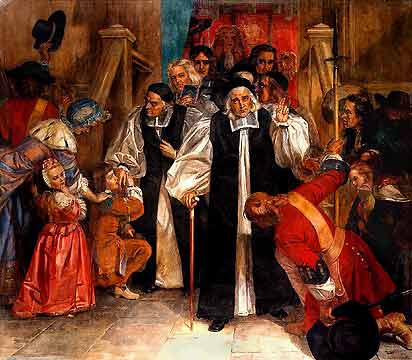SEVEN BOLD BISHOPS SAID "NO" TO THEIR KING'S UNCONSTITUTIONAL ACTION

[Above: Unknown 19th-c artist, The Seven Bishops greet the crowd after their acquittal, June 29, 1688. public domain, Wikimedia]
IN 1687, King James II of England issued a Declaration of Indulgence. This removed restrictions against the free exercise of religion for Catholics and nonconformists (e.g. Baptists and Puritans). A Roman Catholic, James had promised to uphold the Church of England and never to attempt to reinstitute Catholicism. But he began violating his oath within days of ascending the throne. He was notorious for attempts to install Catholics as heads of universities and to stack Parliament with his supporters by changing local electorates.
On the surface of it, the declaration was a good thing and much needed. Among the act’s noble sentiments were words such as:
conscience ought not to be constrained nor people forced in matters of mere religion. . . . For after all the frequent and pressing endeavours that were used in each of [the last four reigns] to reduce this kingdom to an exact conformity in religion, it is visible the success has not answered the design, and that the difficulty is invincible. . . .
We therefore . . . have thought fit by virtue of our royal prerogative to issue forth this our declaration of indulgence, making no doubt of the concurrence of our two Houses of Parliament when we shall think it convenient for them to meet.
James’s declaration scarcely made a splash, so he reissued it in 1688 and ordered Church of England bishops to have their clergy read it in all churches on two consecutive Sundays. This was a serious matter. To agree would undermine the English constitution by violating laws established by Parliament on the say-so of the king. The Archbishop of Canterbury conferred with neighboring bishops. They delivered a respectful petition to the king, asking to be exempted from his order.
James was furious. He accused them of rebellion. In vain the bishops protested that oaths they had taken before God must outweigh their personal loyalty to him. They could not sway James. After most of England’s clergy refused to read the declaration to their parishioners (only 200 of about 10,000 did), James decided to break the bishops by legal action. He charged them with seditious libel because their petition was distributed throughout England (although without their permission).
The king’s council summoned the bishops to appear before them on this day, 8 June 1688. William Sancroft, Archbishop of Canterbury, William Lloyd of St. Asaph, Francis Turner of Ely, John Lake of Chichester, Thomas Ken of Bath and Wells, Thomas White of Peterborough, and Jonathan Trelawny of Bristol refused to put up recognisance (a bail-like deposit) because they were exempt by law. The king ordered them taken to the Tower of London. By now the nation realized the issues at stake and rooted for the bishops. When a boat transferred the seven to the tower, spectators lined the shore of the Thames River and the water was thick with the crafts of well-wishers. Even nonconformists, who would have benefited from the declaration (having suffered much from the Church of England), aligned themselves with the bishops.
The trial took place on 29 June. The outcome was by no means certain because the jury pool was selected from Londoners thought to be “safe” for the king. After debating all night, the jury found the seven bishops not guilty. The verdict was a blow to James. His executive tyranny was checked. The nation went wild with joy. Bonfires illuminated London and surrounding cities all night.
James’s opponents saw his unpopularity as their opportunity to supplant him. Fearing more high-handed actions, and afraid that James’s newly-born son and royal heir James Francis Edward Stuart would rule as a Catholic, several nobles secretly invited James II’s daughter Mary and her Dutch husband William to the throne. Then the bishops showed their true character. Despite what they had suffered at James’s hand, after he fled and William and Mary came over, five refused to perjure themselves by swearing allegiance to the new king. They forfeited their church positions as a consequence.
—Dan Graves





